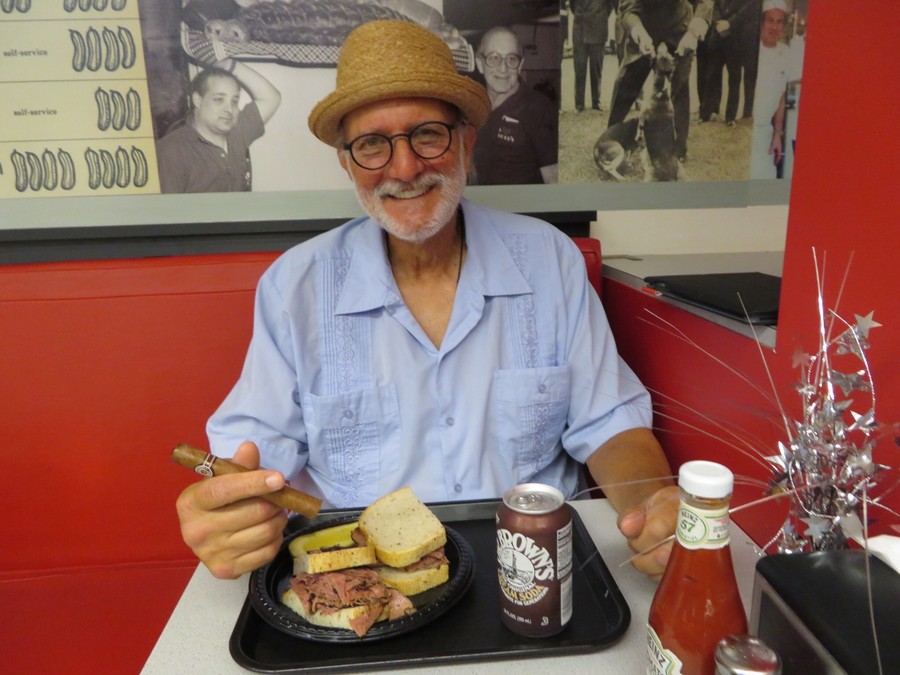Gross, after Cuba, restarts in Israel
WASHINGTON — Alan Gross, 68, wanted to tell me his news: He and his wife, Judy, had made aliyah.
“It came through on May 3, which is Golda Meir’s birthday, and a day after my birthday, which is also Herzl’s birthday,” he said. “It was long overdue. I’d been going there for more than 40 years, and I’d worked in Israel and around the region.”
Gross was released in December 2014, after five years, as part of a broader exchange in which three Cubans convicted of spying were freed from American prisons. The same day, President Obama announced renewed ties with the communist nation.
As a contractor who worked in development, Gross was especially busy in Israel and the Palestinian areas, working on joint Israeli-Palestinian development after the launch of the Oslo peace talks in 1993.
“I was in Israel probably 60 times before I made aliyah,” he said. Now Alan and Judy live in Tel Aviv.
“The first time I went,” when he was 28, “my wife and I co-led a group of 45 teenagers for 45 days for BBYO. It really turned me on. Six months later I was working for BBYO.”
He spent four years with the Jewish youth organization and another four working for the Jewish federation in Washington, and then he returned to his chosen field, development.
What’s his favorite thing about Israel?
“Walking. Every day I walk up to the Carmel Market, into Jaffa and to the Tel Aviv port,” he said.
Also public transportation.
Gross shows off his Rav-Kav card, which gets him onto any mode of transportation — train, bus, light rail — for half price because he’s a senior citizen. He marvels about Israel’s public transportation and notes it takes him 90 minutes to get from his daughter’s home in Jerusalem to his Tel Aviv flat. He wishes more Israelis loved it like he did, fretting — like a veteran Israeli — about the traffic accidents in the country.
He also kvells about a cigar store in Tel Aviv called Brill, where he meets every Friday afternoon with an array of aficionados and talks politics and “fake news” over cigars, hummus and whisky. He acquired the cigar habit in jail.
“The Cuban government would give me a box of nice cigars every time a dignitary visited,” Gross recalled, brandishing one he purchased in Switzerland. “Each box was worth a month’s salary to a Cuban. They got me hooked.”
Would he go back to Cuba given the chance?
“I’d go back in a heartbeat,” he said.
Gross has written twice to the Cuban Embassy here just wanting to talk. He hasn’t heard back.
He wants to see the families of his cellmates, who brought him food. “They helped sustain me for five years,” Gross said. “They’re my family, too.”
Gross lost five teeth to poor nutrition during his time in jail.
Gross is an avid social media presence, and President Trump is a favorite target.
“There is a difference between not fit and unfit, not competent and incompetent. The POTUS is the latter in both,” he wrote recently on Twitter.
“Facebook enabled me to reconnect with a lot of friends and family,” he said. “People didn’t know how to react to me, a lot of people wanted to get together right away, others thought I wanted to be left alone. It’s a wonderful network.
“Twitter is a different story; Twitter could be really brutal. I try not to give rabid responses. Sometimes I fail.”
Gross relishes communication.
“I hadn’t communicated in prison for almost five years,” he said. “The last nine months I was allowed access to email a couple of times a week —not internet — but that changed my life there. That was a tremendous improvement to my psyche.”
Gross also to three lawmakers who led the fight for his release: Sens. Patrick Leahy, D-Vt., and Jeff Flake, R-Ariz., and then-Rep. Chris Van Hollen, D-Md. (now a U.S. senator), as well as to the organized Jewish community.
“The reality is it was the grassroots effort in the Jewish community who tipped the effort,” he said. “There were tens of thousands of emails, literally tens of thousands, that’s what tipped the scales. My redemption from Cuba is a story of activism.”
What does Gross want the world to know?
That he was not a spy and Cuba’s authorities never him considered one: He was convicted of crimes against the state.
Misreporting that characterized him as a spy means he cannot get back into the business he loves -- the development of emerging economies. Gross appears regretful, but also sanguine.
“In the countries where I work, emerging markets, I can imagine people looking at me with a stink eye, ‘is he or isn’t he?’ I’m not, I never was, I never will be [a spy],” he said, “but that eliminates an ability to regain client trust.”
How’s his Hebrew?
Not great, and not as good as his Spanish, which improved vastly in a Cuban jail.
Joking, he says “I can say ‘why not?’ in six languages.”

 45.0°,
Fair
45.0°,
Fair 




